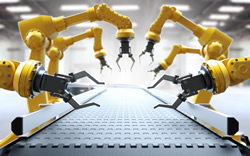Mark Muro, Robert Maxim and Jacob Whiton* say any coronavirus-related recession is likely to bring about a spike in labour-replacing automation.
 As if workers don’t have enough to worry about right now, the COVID-19 pandemic is resurfacing concerns about technology’s impact on the future of work.
As if workers don’t have enough to worry about right now, the COVID-19 pandemic is resurfacing concerns about technology’s impact on the future of work.
Put simply, any coronavirus-related recession is likely to bring about a spike in labour-replacing automation.
What’s the connection between recessions and automation?
On its face, the transition to automation may appear to be a steady, long-term trend.
At the same time, it might seem intuitive that any rise in unemployment in the coming months will make human labour relatively cheaper, thus slowing organisations’ move to technology.
Unfortunately, for the workers poised to be affected by automation, this is not the case.
Robots’ infiltration of the workforce doesn’t occur at a steady, gradual pace.
Instead, automation happens in bursts, concentrated especially in bad times such as in the wake of economic shocks, when humans become relatively more expensive as firms’ revenues rapidly decline.
At these moments, employers shed less-skilled workers and replace them with technology and higher-skilled workers, which increases labour productivity as a recession tapers off.
Several economists have outlined this cyclical nature of automation.
Nir Jaimovich of the University of Zurich and Henry E. Siu of the University of British Columbia reported that over three recessions in the past 30 years, a whopping 88 per cent of job loss took place in “routine” automatable occupations — meaning such jobs accounted for “essentially all” of the jobs lost in the crises.
Brad J. Hershbein of the W.E. Upjohn Institute and Lisa B. Kahn of the University of Rochester looked at almost 100 million online job postings before and after the Global Financial Crisis and found that employers in hard-hit metro areas were steadily replacing workers who performed automatable “routine” tasks with a mix of technology and more skilled workers.
So, even as robots replace workers during boom times at places such as Amazon and Walmart, their influx surges during recessions — not great news for jittery workers.
As virus-related recession fears escalate, it is important to stress that while automation is likely to surge in general, not everyone is equally vulnerable.
The automation surge is likely to affect the most “routine” occupations — jobs in areas such as production, food service, and transportation, for example.
As to what particular groups of workers may be the most exposed, the threats are not evenly distributed.
As restaurants and bars shut down during the pandemic, young workers may be at higher risk because of their heavy concentration in the food industry.
Industrial areas, which have already been hollowed out by previous rounds of automation, remain vulnerable to further robotics and software investment — not just in manufacturing but in the service sector as well.
The pandemic’s damage to global industrial supply chains underscores the vulnerability of such manufacturing regions.
As for what all of this means for the future, the potential of an automation surge reinforces the fact any downturn is likely to bring a new bout of structural change in the labour market and its demand for skills.
If it extends for a while, the downturn could induce firms in food service, retail, and administrative work to restructure their operations toward greater use of technology and higher-skilled workers.
For lower-skill workers, these changes will complicate the return to normalcy.
There likely will be no rest for the weary if COVID-19 lingers.
Along with a public health crisis and epidemic of illness, the virus may well prompt a new spike of automation and lasting changes to an already rapidly evolving job market.
* Mark Muro is a Senior Fellow and Policy Director at the Brookings Institution. He tweets at @MarkMuro1. Robert Maxim is a Research Associate and Jacob Whiton is a research analyst at the Brookings Metropolitan Policy Program.
This article first appeared at www.brookings.edu.











